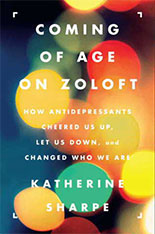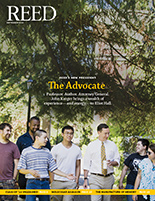
IRIS login | Reed College home Volume 91, No. 3: September 2012
Reediana
Coming of Age on Zoloft (Harper Perennial, 2012)
By Katherine Sharpe ’01
Reviewed by Mary Emily O’Hara ’12

Young adulthood has never been easy, but today’s college students report an alarming incidence of mental illness—particularly depression. Roughly 11% of all college students are currently being treated for depression, according to the American College Health Association, and Katherine Sharpe ’01 was one of them. Her new book, Coming of Age on Zoloft, tracks the explosion of antidepressants using her own medicated adolescence at Reed as an axis. Applying historical research, memoir, and interviews with over 40 medicated people, she ultimately questions our drive to “ask your doctor whether Wellbutrin may be right for you.”
Several of the interviewees show a disturbing insecurity about their own personal identity, constantly questioning reality as distorted or even constructed by the drugs they have come to rely on. Katherine’s central motif is the medicated person’s obsessive quest for evidence; neither the patients nor the pharmaceutical industry seems be certain about a drug’s effect on psychic agency. As the population of medicated children and adolescents continues to swell, identity crises grow along with it, as young adults fret over whether growing up medicated has prevented them from developing into their “true” selves. Katherine interviews young people who obsess about “going off” meds, worried that years of antidepressant use may have altered them in unacceptable ways. But others, such as a subject named Josh, whose father died from suicide, accept the potential risk of a clouded identity: “The question of personal authenticity ‘becomes kind of moot.’ At this point, Josh is pretty sure that antidepressants are what keep him alive.”
The book has already generated controversy: the Atlantic ran a review in June, “Hey, Let’s Not Get Carried Away.” Using terms like “cosmetic psychopharmacology,” the book draws a complex picture of antidepressant use as a huge social experiment. There’s real tension between our limited understanding of how antidepressants really work, and the desperate need of millions of people to find a way to function normally without the weight of exhausting malaise. In the meantime, as 10% of the U.S. population dutifully pops “head meds” in the morning, we can’t help but ask:What does it really mean to be happy? And how far are we willing to go to get there?


LATEST COMMENTS
steve-jobs-1976 I knew Steve Jobs when he was on the second floor of Quincy. (Fall...
Utnapishtim - 2 weeks ago
Prof. Mason Drukman [political science 1964–70] This is gold, pure gold. God bless, Prof. Drukman.
puredog - 1 month ago
virginia-davis-1965 Such a good friend & compatriot in the day of Satyricon...
czarchasm - 4 months ago
John Peara Baba 1990 John died of a broken heart from losing his mom and then his...
kodachrome - 7 months ago
Carol Sawyer 1962 Who wrote this obit? I'm writing something about Carol Sawyer...
MsLaurie Pepper - 8 months ago
William W. Wissman MAT 1969 ...and THREE sisters. Sabra, the oldest, Mary, the middle, and...
riclf - 10 months ago